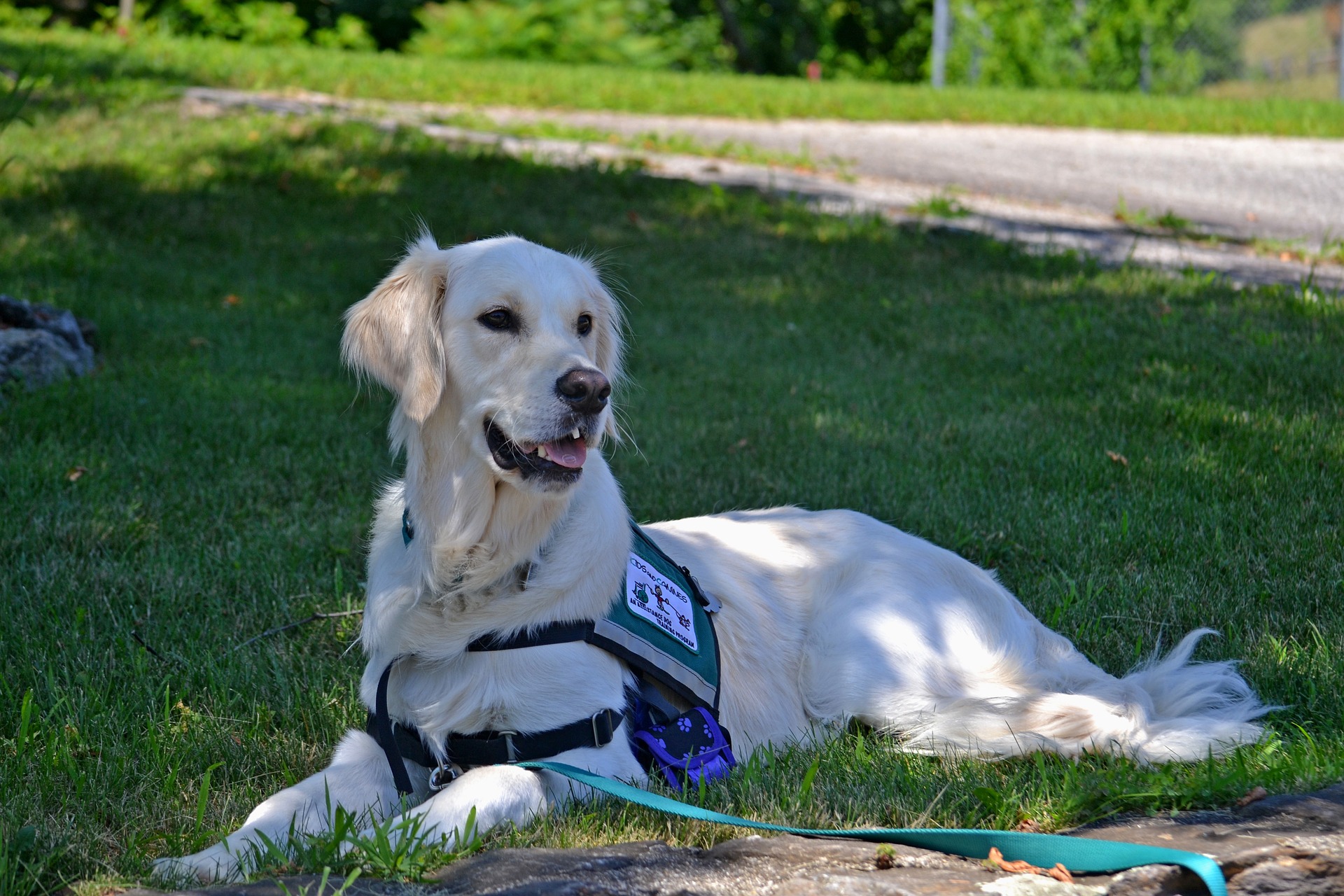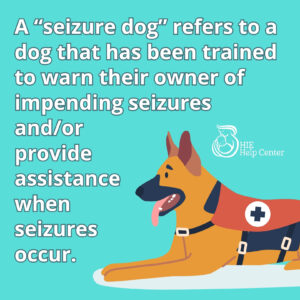Disclaimer: This page is for informational use only. Please note that we do not sell/provide seizure dogs or any other service animals. Continue reading for organizations that can assist you with your search for a service animal.
A “seizure dog” refers to a dog that has been trained (or has spontaneously learned) to warn their owner of impending seizures and/or provide assistance when seizures occur.
What exactly do seizure dogs do?
Seizure dogs are typically able to either detect seizures before they begin OR can provide assistance during/immediately after a seizure. This puts them into two categories: seizure alert dogs and seizure response dogs (terminology use can vary).
Seizure alert dogs are able to detect seizures before they begin
They respond with warning behaviors such as incessant barking or licking, or uninterrupted eye contact. This can notify their owners to (a) take precautions like lying down to avoid injury from falling, or to (b) prevent a seizure through vagus nerve stimulation. If the person who is about to have a seizure is a young child or otherwise in need of assistance, these seizure alert dogs may also be able to notify caretakers.
Seizure response dogs provide assistance during or immediately after a seizure
This may involve notifying family members, pressing an emergency alert button, retrieving a phone, retrieving medications, providing comfort, preventing injuries, opening doors, turning on lights, and more.
Some dogs both alert their owners in advance and respond once a seizure is underway. Moreover, dogs that are trained to respond to seizures will sometimes spontaneously begin to predict them and exhibit warning behaviors.
Are “seizure dogs” recognized as service animals?
 Yes, they are legally recognized as service dogs. Therefore, under the Americans with Disabilities Act, they are allowed in public spaces and buildings.
Yes, they are legally recognized as service dogs. Therefore, under the Americans with Disabilities Act, they are allowed in public spaces and buildings.
What does research say about seizure dogs?
It is obvious that dogs can respond to seizures, but how seizure dogs do is the bigger question. The leading hypothesis suggests that seizure dogs detect seizures by smelling chemical cues that are released just before a seizure. However, what these odors are is thus far unknown. Others have suggested that they may notice extremely subtle behavioral changes or abnormal heart rates.
Amazingly, there is also evidence that seizure dogs can actually decrease the frequency of seizures. This may have something to do with people being less afraid of unexpected seizures and therefore becoming more active, although this mechanism is only speculation.
How are seizure dogs trained?
There are several centers across the United States that train and provide seizure dogs. Exactly how they go about training them, and what tasks they claim their dogs are able to accomplish, varies:
Canine Partners for Life (CPL) trains medical alert dogs. CPL tests puppies in their responses to a person with epilepsy; if they exhibit behavioral changes shortly before seizures, the trainers reinforce these behaviors, and also teach them to respond in helpful ways once a seizure is underway.
Little Angels Service Dogs also trains dogs to warn their owners in advance of seizures, but takes a different approach. They believe all dogs have the ability to predict seizures, but may not respond in ways that are obvious enough for their owners to pick up on. They ask clients to send in a scent sample, taken around the time they have a seizure. While exposing the dog to this, they play an “alert” game. During this game, the dog is rewarded for pawing at the trainer’s leg. They only play this game when the scent sample is present: eventually, the dog learns that in the absence of the “seizure smell,” they won’t get a treat for pawing. Once the dog understands that this scent is a cue they should pay attention to, they can train them to do other things, like alerting a caretaker.
Paws With a Cause does not claim to train alert dogs – only response dogs. CEO Michael Sapp thinks that it’s unusual for dogs to develop alerting skills. However, their website notes that Paws’ response dogs have been known to spontaneously begin warning their owners in advance of a seizure.

Where can I get a seizure dog?
Although centers that train seizure dogs may not be as abundant as providers of other types of service dogs, there are still plenty of choices. One place to start your search is the Assistance Dogs International (ADI) website: they accredit non-profit service dog providers based on standards in ethics and effectiveness, and you can search for programs near you.
It is important to note that a dog does not have to come from an ADI-accredited organization to be legally recognized as a service dog. Some people choose to go through non-accredited providers because they are:
- Unable to find an accredited provider in their area
- Frustrated by the long wait-lists some organizations have
- Struggling to find a suitable center that will give seizure dogs to very young children (many have age minimums)
How much do service dogs cost?
The cost for raising and training a seizure response dog can go up to $24,000. Some organizations report even higher figures. Nonprofits with strong donor bases can provide seizure dogs at little to no cost to the recipient, but businesses are unlikely to do the same. Some non-accredited providers (including Little Angels) are also 501(c)3 nonprofits, but others are solely for-profit businesses. The latter might have hefty fees.
How do I know if getting a seizure dog is a good decision?
 Getting a seizure dog is a big commitment. A dog is a long-term financial investment – even if the dog itself is free, you will have to pay for future dietary and veterinary expenses. You will of course also be responsible for caring for the dog throughout his or her life, which will require brushing up on training (and this will be more extensive than that of a non-working pet).
Getting a seizure dog is a big commitment. A dog is a long-term financial investment – even if the dog itself is free, you will have to pay for future dietary and veterinary expenses. You will of course also be responsible for caring for the dog throughout his or her life, which will require brushing up on training (and this will be more extensive than that of a non-working pet).
Finally, like all dogs, service dogs require affection and patience. They may be emotionally “needy,” they may misbehave, etc. If you generally do not like dogs, you should reconsider getting a seizure dog. However, if you are open to forging a bond with a service animal, your seizure dog could become a beloved companion in addition to providing life-changing assistance.
About HIE Help Center
HIE Help Center is run by ABC Law Centers, a medical malpractice firm exclusively handling birth injury cases since 1997.
If you suspect your child’s HIE may have been caused by medical negligence, contact us to learn more about pursuing a case. We provide free legal consultations, during which we will inform you of your legal options and answer any questions you have. Moreover, you would pay nothing throughout the entire legal process unless we obtain a favorable settlement.
You are also welcome to reach out to us with inquiries that are not related to malpractice. We cannot provide individualized medical advice, but we’re happy to track down informational resources for you.
Sources:
- PBS: Can Dogs Predict Seizures?
- Paws With a Cause: Seizure Response Dogs
- Canine Partners for Life: Seizure Alert Dogs
- Seizure: Seizure-alert dogs — fact or fiction?
- Seizure: Effect of trained Seizure Alert Dogs® on frequency of tonic–clonic seizures
- Seizure: The use of seizure-alert dogs
- Epilepsy Research: Can seizure-alert dogs predict seizures?
- Epilepsy Foundation: Seizure Dogs




Leave a Reply
You must be logged in to post a comment.